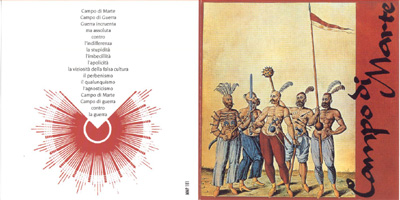 It
is believed that only two LPs were released by the Help! subsidiary of
RCA Italiana. They appeared in 1972. One was the legendary Quella
Vecchia Locanda album, the other was the first Procession album. We
have already proferred the slightly heretical view that the first QVL
is perhaps not quite as engrossing as the second QVL. Now we shall
assail the court of public opinion even further by proposing not merely
that the first Procession album is better than the second (entitled Fiaba,
which appeared in 1974), but also that it is the more remarkable and
interesting of the two Help! albums. This record, entitled Frontiera
and focusing on the social problem of urban dislocation, is a classic
of the hard rock no less than of the progressive rock genres. It is
above all a guitar album. You actually don’t hear any keyboards, just
two guitarists in assorted electric and acoustic combinations, with the
occasional mandolin, over a supportive drum and bass rhythm section,
and competent vocals (plus harmonica) rounding out a warm, full-bodied
sound.
It
is believed that only two LPs were released by the Help! subsidiary of
RCA Italiana. They appeared in 1972. One was the legendary Quella
Vecchia Locanda album, the other was the first Procession album. We
have already proferred the slightly heretical view that the first QVL
is perhaps not quite as engrossing as the second QVL. Now we shall
assail the court of public opinion even further by proposing not merely
that the first Procession album is better than the second (entitled Fiaba,
which appeared in 1974), but also that it is the more remarkable and
interesting of the two Help! albums. This record, entitled Frontiera
and focusing on the social problem of urban dislocation, is a classic
of the hard rock no less than of the progressive rock genres. It is
above all a guitar album. You actually don’t hear any keyboards, just
two guitarists in assorted electric and acoustic combinations, with the
occasional mandolin, over a supportive drum and bass rhythm section,
and competent vocals (plus harmonica) rounding out a warm, full-bodied
sound.
 Now
this is a nice, obscure one from 1973. Remember, it was a year that for
Itaprog was a sort of Halcyon days, and this is a record for those who
actually derive relaxation from ‘hard’ rock instrumentation in skillful
arrangements. So the product is both intellectually advanced and highly
cultured musically. Campo di Marte has two great assets: its
fuzz-toning, feed-backing guitar sounds, and a genius for varying
arrangements with ongoing and massive shifts in texture, time
signature, motif, and mood. Among the anomalies of the instrumentation
are: the occasional two drummers, some trombone work, choral voices,
and much more. There are vocals, but no vocalist per se. Campo di Marte
is a “a field of war against War”. Within the genre or movement it
should stand as one of the great achievements, but it also stands well
enough when considered in isolation.
Now
this is a nice, obscure one from 1973. Remember, it was a year that for
Itaprog was a sort of Halcyon days, and this is a record for those who
actually derive relaxation from ‘hard’ rock instrumentation in skillful
arrangements. So the product is both intellectually advanced and highly
cultured musically. Campo di Marte has two great assets: its
fuzz-toning, feed-backing guitar sounds, and a genius for varying
arrangements with ongoing and massive shifts in texture, time
signature, motif, and mood. Among the anomalies of the instrumentation
are: the occasional two drummers, some trombone work, choral voices,
and much more. There are vocals, but no vocalist per se. Campo di Marte
is a “a field of war against War”. Within the genre or movement it
should stand as one of the great achievements, but it also stands well
enough when considered in isolation. Here
we have the album by Blocco Mentale from 1973. It is called Poa, and this time I can tell you not only
that the title is Greek for sure, but also what it means: ‘grass’. My
understanding is that the title is indicative of environmentalist and
conservationist themes that are presented in the songs. What can we
say, therefore, about this record? In deference to the sentiments of
others we will definitely not want to use terms like ‘masterpiece’, and
we may even encounter some displeasure if we air the term ‘classic’.
But to give Blocco Mentale their due, Poa
takes up its niche near the pinnacle. It appears to be an effort to
define a certain type of progressive music, which we might want to call
light prog. The finale, entitled “Verde”, sounds as though it were
meant to be a pop song, as do other parts of the record, but this music
is of course way too sensitive to ever sell for a commercial success.
The whole product demands absolutely nothing of the listener, rather,
the slightest concentration will yield relaxation.
Here
we have the album by Blocco Mentale from 1973. It is called Poa, and this time I can tell you not only
that the title is Greek for sure, but also what it means: ‘grass’. My
understanding is that the title is indicative of environmentalist and
conservationist themes that are presented in the songs. What can we
say, therefore, about this record? In deference to the sentiments of
others we will definitely not want to use terms like ‘masterpiece’, and
we may even encounter some displeasure if we air the term ‘classic’.
But to give Blocco Mentale their due, Poa
takes up its niche near the pinnacle. It appears to be an effort to
define a certain type of progressive music, which we might want to call
light prog. The finale, entitled “Verde”, sounds as though it were
meant to be a pop song, as do other parts of the record, but this music
is of course way too sensitive to ever sell for a commercial success.
The whole product demands absolutely nothing of the listener, rather,
the slightest concentration will yield relaxation. Dedicato
a Frazz, the only recording by Semiramis, came out on the Trident
label in 1973, and you seldom find it named without the word ‘classic’
associated. So what is it about this record? Have the pundits taken
leave of their senses entirely? The band consisted entirely of kids.
They were all between 15 and 17 years old at the time, and I confess
they sound out of tune to me – even if they did have a well-in-tune and
proficient vibraphonist. Admittedly the vocals are excellent, and
though the compositions seem daft they do follow each other logically.
There is also a ‘band feel’, as though the five performers have a lot
of confidence in each other. What grates is the sharp contrasts that
arise within songs and even within song sections. When compared to
other Itaprog classics, Dedicato a Frazz seems, not naïve,
but perhaps a little excessive in its exuberance. The Trident label
produced seven LPs in all, I think, plus a couple that never got
released. In addition to Semiramis they include the first album by Opus
Avantra, the last by The Trip, and of course Biglietto Per L’inferno,
the most renowned of all. Those are all from the top drawer, but
perhaps also a little overrated, which may have something to do with
the fancy Trident LP label, where side one is completely given over to
a sketch of the sea-god Neptune holding a trident.
Dedicato
a Frazz, the only recording by Semiramis, came out on the Trident
label in 1973, and you seldom find it named without the word ‘classic’
associated. So what is it about this record? Have the pundits taken
leave of their senses entirely? The band consisted entirely of kids.
They were all between 15 and 17 years old at the time, and I confess
they sound out of tune to me – even if they did have a well-in-tune and
proficient vibraphonist. Admittedly the vocals are excellent, and
though the compositions seem daft they do follow each other logically.
There is also a ‘band feel’, as though the five performers have a lot
of confidence in each other. What grates is the sharp contrasts that
arise within songs and even within song sections. When compared to
other Itaprog classics, Dedicato a Frazz seems, not naïve,
but perhaps a little excessive in its exuberance. The Trident label
produced seven LPs in all, I think, plus a couple that never got
released. In addition to Semiramis they include the first album by Opus
Avantra, the last by The Trip, and of course Biglietto Per L’inferno,
the most renowned of all. Those are all from the top drawer, but
perhaps also a little overrated, which may have something to do with
the fancy Trident LP label, where side one is completely given over to
a sketch of the sea-god Neptune holding a trident. Samadhi,
they were just a continuation of Raccomandata Ricevuta Ritorno, right?
So, what’s up? Well, for one thing, the Samadhi band which recorded in
1975 drew personnel from several earlier recorded bands: only the
singer and guitarist came from RRR. Superficially the sound was very
similar, however, because the singer is quite distinctive. The singer
is highly representative of 70s Itaprog, possessing many characteristic
qualities such as lilt, a capacity for exploring sonority, and coarse
edges that are recognizable as part of the singer’s individuality. But
perhaps those are also reasons why these records are not widely known,
especially if the ensemble effects are at all subtle. Anyway, the
Samadhi record stands on its own two feet with a raison d’être
that is unrelated yet complementary to that of RRR. Both band and
record bear the name Samadhi, meaning ‘inner peace’, which is from the
Sanskrit and part of the Buddhist tradition, reminding us that this is
in large part an ascetic exercise, like many of the classics of the
genre. Musically, there are highly cultured rock passages, plus the
anomaly of an unusually well-placed horn section.
Samadhi,
they were just a continuation of Raccomandata Ricevuta Ritorno, right?
So, what’s up? Well, for one thing, the Samadhi band which recorded in
1975 drew personnel from several earlier recorded bands: only the
singer and guitarist came from RRR. Superficially the sound was very
similar, however, because the singer is quite distinctive. The singer
is highly representative of 70s Itaprog, possessing many characteristic
qualities such as lilt, a capacity for exploring sonority, and coarse
edges that are recognizable as part of the singer’s individuality. But
perhaps those are also reasons why these records are not widely known,
especially if the ensemble effects are at all subtle. Anyway, the
Samadhi record stands on its own two feet with a raison d’être
that is unrelated yet complementary to that of RRR. Both band and
record bear the name Samadhi, meaning ‘inner peace’, which is from the
Sanskrit and part of the Buddhist tradition, reminding us that this is
in large part an ascetic exercise, like many of the classics of the
genre. Musically, there are highly cultured rock passages, plus the
anomaly of an unusually well-placed horn section.